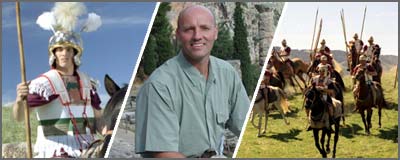

Review of the History Channel's "Alexander"
Cheesy but Factual Documentary Delivers Chicks with Snakes and Peter Green too!
Premieres Sunday, November 7th, 8pm/7c on The History Channel (official site).
Reviewed by Tim Spalding, www.isidore-of-seville.com. Permission to copy granted, with attribution.
On November 24th, movie fans will feast their eyes on Oliver Stone's hugely expensive, lushly imagined Alexander epic. On November 7th, the History Channel will be offering history buffs a canape of sorts—a three-hour low-to-medium-budget Alexander documentary. Of the former we may expect breath-taking scenery, dazzling CGI, and a cast of thousands led by A-list actors. Of the latter, I can report uninspiring scenery, cheesy CGI, and a cast of dozens of no particular distinction, save a few top-drawer academics. The History Channel's "Alexander the Great" has many failings, some hilarious. But, when all's said and done, if you're into history, particularly ancient history, you will enjoy the History Channel's "Alexander the Great"—your appetite whetted for the main course to come.
Snakes and Scholars
Unlike some previous Alexander shows, the current offering has academic heft. Alexander-studies royalty Peter Green (Alexander of Macedon) and Brian Bosworth (Conquest and Empire) appear regularly on camera. Green shines—he's nearly as entertaining on screen as he is in the classroom.[1] William Murray, a University of South Florida historian and archaeologist of distinction, also gets a lot of screen time, and was apparently the lead consultant.
The show's writers are also genuinely conscientious about the history of Alexander. There are few flat-out "errors." But as any historian of Alexander will tell you, the trick lies in picking a path through the many conflicting (or simply fictitious) incidents, to form a coherent, defensible narrative. By this standard, the whole hangs together, but the details are sometimes better stories than history. Alexander's meeting with the Persian envoys is retold as fact, and "Aristotle's cave" dutifully identified as Alexander's schoolhouse. Every one of the (dubious) Oracle-of-Delphi tales are swallowed whole. In the latter case, the oracles justify some swell footage, including an interview with a comely Greek tour-guide, and Delphi is, after all, one of those things everyone has heard of. Watching the show on the sofa with my wife, I initially added helpful interjections like "that story's pretty dubious," "that one's solid," "that's iffy," until she told me to shut up already. Questionable stories aside, the major outlines are correct, and they sometimes notice differences between sources. What more can you ask for in a television program?
You could ask for dramatizations, and the filmmakers provide them. But the dramatized scenes are not, like the history, "good enough for TV." They are instead cheesy, low-budget affairs which detract from the excitement and grandeur of the story.
The worst scenes come early. Plutarch's story that Philip spied "a snake lying stretched out by Olympias as she slept" (Alex. 2.4) becomes salacious footage of Olympias fondling and writhing underneath a serpent. The image is memorable, more so for being repeated over the three-hour show at the slightest provocation. A good drinking game could be based on it—when you see the hottie with the snake, drink.
Parmenio's Wardrobe Malfunction
Fortunately, the actors are mostly silent, acting out scenes from Alexander's life behind voiced narration. Four have speaking parts, and they embody both the strengths and weakness of the show. They are the four main historians—Arrian, Plutarch, Curtius, and Diodorus. In conception it's an excellent idea; the viewer gets a sense of the different "strands" of the historical tradition. But the technique isn't used as well as it might be; there are no conflicting accounts given. And the actors don't work. Plutarch is a dopey, earnest over-actor telling a story to children. Diodorus proclaims in an grumbling voice, inspiring my wife and I to look at each other in mirthful disbelief—what Renfair did this guy come from? Curtius is somewhat better, and as the story progresses, we see more of him.
The non-speaking actors are no standouts either. As mentioned, Olympias is confirmedly sexy, particularly in flagrante delicto cum serpente, and comes across quite as treacherous as I imagine her to be. The dark-haired youth playing Alexander seems young and passive, but grew on me somewhat. Nobody else has any weight, and together they are painful to watch—a bad community theatre doing scenes from Julius Caesar. For some reason Philip and Alexander's general Parmenio—an old dog when Philip was alive—is played by a much younger man. The same shot of him on horseback (drinking-prompt number two) is used every time, a flimsy, perhaps plastic, cheek guard flapping around wildly and absurdly.
The Invincible Macedonian Shmoes
Parmenio's cheek guards set the tone for all the military scenes. The same shots appear again and again, like the stock moments of the Saturday morning cartoons of my youth—"Star Blazers" or "He Man." Sometimes a shot is flipped horizontally to illustrate that an army has changed direction. The announcer solemnly invokes the invincible Macedonian phalanx, perhaps "hungry for total war" [sic], while a tiny gaggle of extras in shiny non-matching armor troop around uncoordinatedly, sarissas at various angles. Cavalry charges muster a handful of undersized riding ponies. Persian armies are stock Orientals in matching purple robes and yellow turbans. The Theban Sacred band, introduced correctly as pairs of male lovers, are given a dark and scantily-clad treatment, thrusting their bare chests and long spears like revelers on the "tribal" float in a gay-pride parade.
To make combat more exciting, the camera gets jerky, blurry, close-in and impressionistic, and the shots are layered on top of each other so the limitations of any one version are difficult to discern. I've seen this effect before: it is "combat" in the History Channel's visual argot. For variation, these scenes are intercut with quick pans across paintings of various periods, and four or five different computer-generated effects. As for the CGI, I'm not even sure they were all designed for the effort at hand; one blurry advancing line looks rather Japanese, and all told, it's a surprisingly lame effort. Wake up people, this is 2004!
Other details are hit-or-miss. Impressive objects from the excavations at Vergina get shots as close and loving as those of Olympias and her slithery friend. Nothing could reduce their impact. And it was nifty to get a real ox-cart and mess of rope to illustrate the Gordian Knot. But what are we to make of the slow pan across a throne, illustrating the Macedonian dynasty but distinctly oriental in design and, in fact, sporting clear Arabic letters in copper relief?
Woodward to the Rescue
If the reenactments are dreadful, the on-camera presenter "actor/celebrity" Peter Woodward (so-called on his own website) is rather better, and from the Granicus on he gets more and more excitable. In his khaki outfits he stares fixedly and talks loudly at the camera—over-caffeinated perhaps, but watchable. His battle narratives, delivered while ankle-deep in water at Tyre or stumbling up "rough ground" at Issus are more exciting and even violent than the stock "combat" shots. He even seems genuinely inspired standing inside the oracle of Zeus at Siwah, describing the oracle's reply that Alexander was the son of a God. (Cue Olympias and the snake.)
After Gaugamela, as often happens, the story is telescoped dramatically. Bessus' death is falsely implied to take place shortly after that of Darius. Porus goes by quickly. Alexander's wounding among the Malians gets some time (and ketchup), but the rest is a blur. The murder of Cleitus and the Gedrosian desert—staples of any "downfall" narrative—are entirely absent.
And then suddenly Alexander lies dying in Babylon, and the solemn scene is marred by a common but regrettable misuse of words: "It is at this critical moment that the enormity of Alexander's influence is acutely felt." The voice-over indicates Alexander closed his eyes for the last time, and the actor dutifully follows the stage direction.
If the death underwhelms, it is wonderful to find the story lurching on, following Alexander's body from Babylon, hijacked by Ptolemy to rest in Egypt. And soon Woodward's there, yelling at us underneath the Mosque of Daniel in Alexandria. Alexander's death also brings the scholars back, with excellent footage from Murray, Green, and Bosworth. Murray gives the Jim Morrison theory—death was a good career move. Bosworth becomes animated at Alexander's influence, Green solemn and intense describing the Successors' fearful use of Alexander's image.
Forget the bad actors, these guys make the whole thing worthwhile (I for one would watch Green read the phone book). Woodward, however, delivers the final, intense line: "He is and will always remain, Alexander the Great."
It's a cheesy end to an often cheesy show but, after all, it's true.


Wiki Classical Dictionary, currently focused on Alexander
All material © 2000–2005 Tim Spalding.
Presented in Association with Amazon
If you enjoy this site you may also like these other sites by me:
Genghis Khan on the Web More than 275 links about the Mongol conqueror.
Cleopatra on the Web Over 410 resources on Cleopatra. Includes 168 images.
Ancient Library and the Wiki Classical Dictionray, major new reference sources for ancient studies.
Hieroglyphs! Over 125 links about Egyptian hieroglyphs for all ages and levels of knowledge.